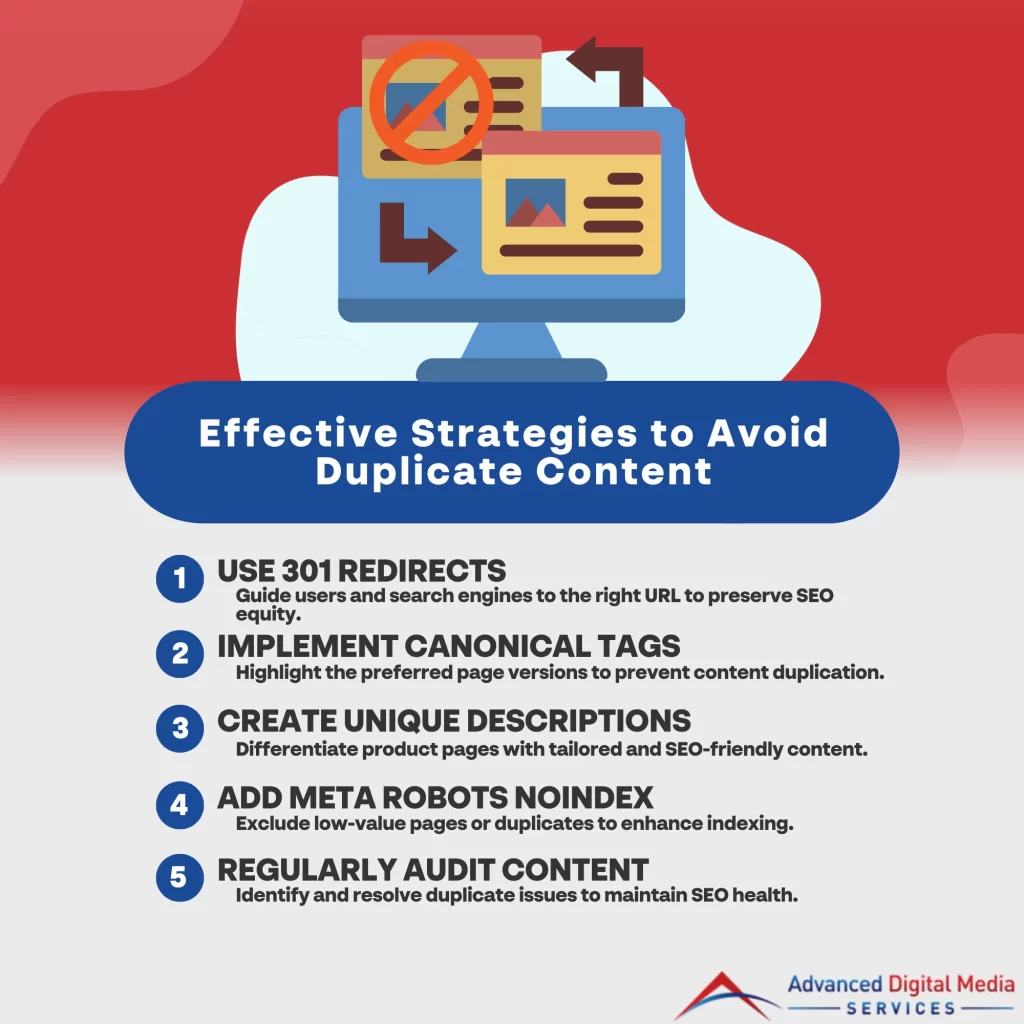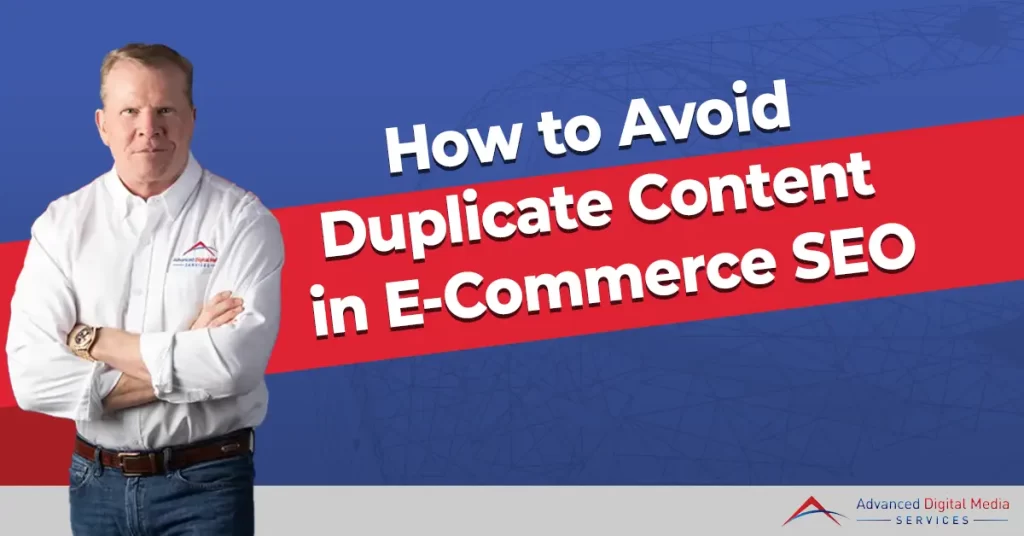To avoid duplicate content in e-commerce SEO, you should employ several strategic methods. First, utilize 301 redirects to preserve SEO equity and improve user navigation. Next, implement canonical tags to highlight the preferred versions of your product pages, which is essential for managing variations. Finally, use meta robots no index directives on pages that provide low value, like duplicates from filters. These tactics not only enhance your site’s visibility and authority but also streamline user experience. Mastering these techniques is critical for successful e-commerce operations, and there’s plenty more to explore on optimizing your content strategy.

Key Takeaways
- Create unique product descriptions for each item to differentiate them from similar products and enhance SEO performance.
- Utilize 301 redirects to consolidate similar pages and transfer SEO equity to the primary content.
- Implement canonical tags on product variations to indicate the preferred version for search engines.
- Use the Meta Robots no-index tag on low-value pages or duplicate product variations to streamline search engine indexing.
- Regularly audit your site to identify and address duplicate content issues, ensuring a clear content strategy.
What is duplicate content in SEO?
Duplicate content in SEO refers to instances where identical or very similar content appears on multiple web pages, either within the same domain or across different domains. Understanding eCommerce is essential here, as duplicate content can dilute your SEO content strategy effectiveness. When you engage in eCommerce content creation, it’s important to guarantee each page offers unique value. Search engines struggle to determine which version of content to rank, potentially harming your visibility. This issue can lead to lower organic traffic and reduced sales, impacting your overall success. By strategically crafting distinct content for each product or category, you enhance SEO performance and improve user experience, ultimately driving better results for your online business.
How to avoid duplicate content
To effectively avoid duplicate content, you’ll want to implement strategic measures like 301 redirects, canonical tags, and meta robots no-index. Each of these techniques plays an essential role in guiding search engines and users to the most relevant version of your content. By applying these strategies, you can greatly enhance your site’s SEO performance and maintain a clear online presence.
1. 301 redirects
When managing your e-commerce site, implementing 301 redirects is essential for avoiding duplicate content issues. These permanent redirects guide search engines and users to the correct URL, which is vital for effective e-commerce SEO. Here are four key benefits of using 301 redirects:
- Preserves SEO Equity: Redirects help maintain your site’s ranking power by transferring link juice.
- Improves User Experience: Users are directed to the intended content, reducing frustration.
- Consolidates Content: By merging similar pages, you create a clearer site structure for SEO content for e-commerce.
- Enhances Crawl Efficiency: Search engines can index your site more effectively, benefiting your content and commerce strategy.
2. Canonical tags
One effective method for preventing duplicate content is the use of canonical tags. By implementing these tags, you signal to search engines which version of a webpage you prefer to be indexed. This is essential in an e-commerce content strategy where product variations can easily lead to duplicated content across different URLs. Understanding why SEO is important for e-commerce means recognizing that preserving your site’s authority is key. E-commerce SEO services can help you optimize your product pages while utilizing canonical tags to consolidate link equity. This strategic approach not only enhances search engine visibility but also improves user experience, ensuring potential customers find the right products without stumbling upon duplicate content issues.
3. Meta robots no-index
Frequently overlooked, the use of meta robots no-index tags can be an essential strategy in avoiding duplicate content on your e-commerce site. These tags guide search engines on how to handle specific pages, ensuring that your e-commerce content marketing strategy is effective. Here’s how to leverage no-index tags strategically:
- Apply no-index to filter pages like search results.
- Use it for duplicate product variations to streamline SEO.
- Implement low-value content that doesn’t enhance user experience.
- Regularly audit your site to identify pages needing no-index.
Understanding what is content marketing in SEO and recognizing is SEO important for eCommerce can help you fine-tune your approach, driving better visibility and engagement without the pitfalls of duplication.
Frequently Asked Questions
How Does Duplicate Content Affect My E-Commerce Site’s SEO Rankings?
Duplicate content can dilute your e-commerce site’s authority, causing search engines to struggle with indexing. This may lead to lower rankings, as they prioritize unique content that enhances user experience and drives engagement.
What Tools Can Help Identify Duplicate Content Issues?
When your content’s a sea of sameness, identifying duplicate issues becomes essential. Tools like Copyscape, Siteliner, and SEMrush can help you uncover duplicates, ensuring your site stands out and attracts organic traffic effectively.
Can I Use Canonical Tags to Manage Duplicate Content?
Yes, you can use canonical tags to manage duplicate content effectively. They signal to search engines which version of a page to prioritize, helping consolidate ranking signals and improve your site’s overall SEO performance.
How Often Should I Audit My Site for Duplicate Content?
Every quarter’s a smart move for auditing your site, ensuring you catch any duplicate content early. Regular checks help maintain your SEO health, boosting rankings and keeping that organic traffic flowing. Stay proactive!
What Are the Consequences of Ignoring Duplicate Content in SEO?
Ignoring duplicate content in SEO can lead to decreased search rankings, diluted link equity, and poor user experience. It’s essential to prioritize unique content to enhance visibility and guarantee your site attracts organic traffic effectively.
Conclusion
Addressing duplicate content in your e-commerce SEO strategy is essential for maintaining search rankings, improving user experience, and driving organic traffic. By implementing 301 redirects, using canonical tags, and strategically applying meta robots no-index, you can effectively manage duplicate pages and maximize your site’s visibility. A well-structured ecommerce content strategy ensures that each product page adds value rather than competing for rankings. Regular SEO audits and content optimization efforts will help you stay ahead, preventing duplicate content pitfalls from impacting your sales and online presence. Take a proactive approach, and your e-commerce business will thrive with better rankings and sustained growth.






